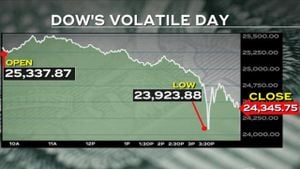Germany is set to hold early parliamentary elections on February 23, 2025, following the collapse of Chancellor Olaf Scholz’s coalition government and the decisive no-confidence vote cast by lawmakers on December 16, 2024. This rare moment of political upheaval highlights significant instability for Europe’s largest economy and most populous nation.
Chancellor Scholz faced significant dissent within the Bundestag, managing to secure support from only 207 lawmakers—far short of the 367 votes needed to maintain his leadership. Meanwhile, 394 parliamentarians voted against him with 116 members abstaining. The outcome reflects the challenging political environment Scholz faces, particularly following the withdrawal of the Free Democratic Party (FDP) from the so-called ‘traffic light coalition’ comprising the Social Democratic Party (SPD), the Greens, and the FDP.
Following the unexpected defeat, Scholz is now required to formally request President Frank-Walter Steinmeier to dissolve the parliament, paving the way for elections. Steinmeier, who is expected to favor the election date of February 23, has 21 days to respond to the request, underscoring the pressing political realities at play.
The collapse of Scholz's coalition government primarily relates to tensions over economic policies and spending agreements. The head of the FDP and former Finance Minister Christian Lindner was dismissed by Scholz amid disagreements about financing strategies to rejuvenate Germany’s stagnation-prone economy. The coalition had struggled with disputes over fiscal policy and energy reforms, leading to months of discord, prior to its ultimate disintegration.
With early elections already scheduled, campaigning has commenced. Recent opinion polls indicate Friedrich Merz’s Christian Democratic Union (CDU) leading the race with projected support exceeding 30%. This shift marks a resurgence for the CDU, which has been sidelined since the 2021 elections. Merz has been vocally condemning Scholz’s administration, claiming it has dangerously increased debt burdens for future generations and promising conservative fiscal policies if elected.
The political atmosphere is rife with competition as alternative parties emerge. The far-right Alternative for Germany (AfD) has gained traction, polling at approximately 18%. Despite being unlikely to govern as mainstream parties consistently refuse to engage with it, the AfD continues to influence electoral discourse, particularly concerning immigration policies.
Scholz’s SPD is struggling to maintain its footing, currently trailing at about 17% support. To regain voter confidence, Scholz is emphasizing reforms intended to modernize the country’s fiscal policies, such as increasing the minimum wage and altering value-added tax rates on food. His administration remains focused on presenting Germany as the largest supplier of military support to Ukraine, albeit with caution against engaging directly with the conflict.
Vice Chancellor Robert Habeck of the Greens has also declared his candidacy for chancellor, though his party’s polling at just 13% reflects significant internal challenges faced over the past months.
Economic stagnation looms large over this upcoming election. Once heralded as the economic powerhouse of Europe, Germany now grapples with stagnation and high energy costs piled atop global market competitiveness concerns. Critics accuse Scholz’s administration of failing to reconcile ambitious climate goals with economic realities leading to substantial public discontent.
The next elections hold immense stakes, not only for Germany but for the broader European Union. A potential Merz-led government may usher back to conservative fiscal policies and reshaping the EU's budgetary priorities. The rise of the AfD could reflect broader trends across Europe, where far-right parties are gaining influence and complicity within EU and NATO frameworks.
The recent parliamentary dynamics have ushered Scholz to navigate through unprecedented uncertainty as Germany experiences its sixth no-confidence vote since 1949. A vote from which he has now entered what is described as the caretaker phase of leadership until the new elections, overseeing what remains of governance until February.
Unlike the previous governments formed out of largely stable coalitions, the current political state hints at more fractious coalitions, often hereafter difficult to maintain. The crux of governance will pivot around the economic, environmental, and social policies shapes forthcoming elections as the nation approaches its next political chapter.



